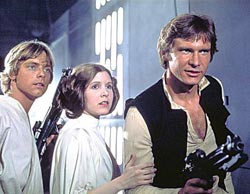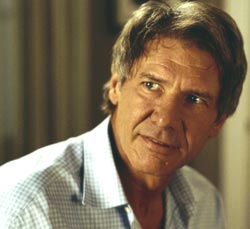|
Harrison Ford

If Harrison Ford had listened to the advice of studio heads early in his career, he would have remained a carpenter and never gone on to star in some of Hollywood’s biggest films and become one of the industry’s most bankable1 stars. Born July 13, 1942, in Chicago and raised in a middle-class suburb, he had an average childhood. An introverted loner2, he was popular with girls but picked on3 by school bullies4. Ford quietly endured their everyday tortures5 until he one day lost his cool and beat the tar out of6 the gang leader responsible for his being repeatedly thrown off an embankment. He had no special affinity7 for films and usually only went to see them on dates8 because they were inexpensive and dark. Following high school graduation, Ford studied English and Philosophy at Ripon College in Wisconsin. An admittedly lousy9 student, he began acting while in college and then worked briefly in summer stock10. He was expelled from the school three days before graduation because he did not complete his required thesis.In the mid-‘60s, Ford and his first wife, Mary Marquardt (his college sweetheart11) moved to Hollywood, where he signed as a contract player12 with Columbia and, later, Universal. After debuting onscreen in a bit as a bellboy13 in Dead Heat on a Merry-Go-Round (1966), he played secondary roles, typically a cowboy, in several films of the late ‘60s and in such TV series as Gunsmoke, The Virginian, and Ironside. Discouraged with both the roles he was getting and his difficulty in providing for his young family, he abandoned acting and taught himself carpentry14 via books borrowed from the local library. Using his recently purchased run-down15 Hollywood home for practice, Ford proved himself a talented woodworker, and, after successfully completing his first contract to build an out-building16 for Sergio Mendez, found himself in demand with other Hollywood residents (it was also during this time that Ford acquired his famous scar, attempting to belt up while driving).
Meanwhile, Ford’s luck as an actor began to change when a casting director friend for whom he was doing some construction helped him get a part in George Lucas’ American Graffiti (1973). The film became an unexpected blockbuster and greatly increased Ford’s familiarity17. Many audience members, particularly women, responded to his turn as the gruffly18 macho Bob Falfa, the kind of subtly charismatic portrayal that would later become Ford’s trademark.
However, Ford’s career remained stagnant19 until Lucas cast him as space pilot Han Solo in the megahit Star Wars (1977), after which he became a minor star. He spent the remainder of the 1970s trapped20 in mostly forgettable films (such as the comedy Western The Frisco Kid with Gene Wilder), although he did manage to land the small role of Colonel G. Lucas in Francis Ford Coppola’s Apocalypse Now (1979).

The Empire Strikes Back (1980)
The early ‘80s elevated Ford to major stardom with the combined impact of The Empire Strikes Back (1980) and his portrayal of action-adventure hero Indiana Jones in Raiders of the Lost Ark (1981), which proved to be an enormous hit. He went on to play “Indy” twice more, in 1984’s Indiana Jones and the Temple of Doom and Indiana Jones and the Last Crusade in 1989. Ford moved beyond popular acclaim with his role as a big-city police detective who finds himself masquerading as an Amish21 farmer to protect a young murder witness in Witness (1984), for which he received a Best Actor Oscar nomination for his work, as well as the praise of critics who had previously ignored his acting ability.
Having appeared in several of the biggest money-makers22 of all time, Ford was able to pick and choose his roles in the ‘80s and ‘90s. Following the success of Witness, Ford re-teamed with the film’s director, Peter Weir, to make a film adaptation of Paul Theroux’s novel – The Mosquito Coast. The film met with mixed critical results, and audiences largely stayed away, unused to the idea of their hero playing a markedly23 flawed24 and somewhat insane character. Undeterred25, Ford went on to choose projects that brought him further departure from the action films responsible for his reputation. In 1988 he worked with two of the industry’s most celebrated directors, Roman Polanski and Mike Nichols. With Polanski he made Frantic, a dark psychological thriller that fared26 poorly among critics and audiences alike. He had greater success with Nichols, his director in Working Girl, a saucy27 comedy in which he co-starred with Melanie Griffith and Sigourney Weaver. The film was a hit, and displayed Ford’s largely unexploited comic talent.
Ford began the 1990s with Alan J. Pakula’s courtroom thriller Presumed Innocent [Презумпция невиновности], which he followed with another Mike Nichols’ film, Regarding Henry [Кое-что о Генри] (1991). The film was a flop28 with both critics and audiences, but Ford allayed29 his disappointment the following year when he signed an unprecedented 50-million-dollar contract to play CIA agent Jack Ryan in a series of five movies based upon the novels of Tom Clancy. The first two films of the series, Patriot Games (1992) and Clear and Present Danger (1994), met with an overwhelming success mirrored by that of Ford’s turn as Dr. Richard Kimball in The Fugitive (1993). Ford’s next effort, Sydney Pollack’s 1995 remake of Sabrina, did not meet similar success, and this bad luck continued with The Devil’s Own (which reunited him with Pakula), despite Ford’s seemingly perfect pairing with Brad Pitt. However, his other 1997 effort, Wolfgang Petersen’s Air Force One [Самолет президента], more than made up for the critical and commercial shortcomings of his previous two films, proving that Ford, even at 55, was still a bona fide30 action hero. Stranded31 on an island with Anne Hesche for his next feature, the moderately successful romantic adventure Six Days, Seven Nights (1998), Ford subsequently appeared in the less successful romantic drama Random Hearts [Паутина лжи]. Bouncing back a bit with Robert Zemeckis’ horror-flavored thriller What Lies Beneath, the tension would remain as Ford and crew raced to prevent a nuclear catastrophe in the fact based deep sea thriller K-19: The Widowmaker.

What Lies Beneath (2000)
Ford’s activity slowed down a bit in 2003, with only one performance that year, in Ron Shelton’s crime comedy Hollywood Homicide [Голливудские копы] alongside Josh Hartnett; the film opened32 to mixed reviews. After a couple of years off from big-budget Hollywood efforts, Ford starred in Richard Loncraine’s 2006 crime thriller Firewall. That year, the sixty-four year-old star also announced plans to to re-team with Steven Spielberg for the fourth installment in the Indiana Jones series. As of 2006, Ford also announced a forthcoming starring role in Manhunt, playing the nineteenth century Colonel who hunts down James Wilkes Booth after Lincoln’s assassination.
Ford, who does not like doing interviews and has maintained a strict privacy regarding33 his personal life, made a home with his second wife, screenwriter Melissa Mathison, whose credits include E.T. The Extra-Terrestrial (1982); they filed for divorce in the early 2000s, and their divorce became finalized in 2004. Prior to that, they lived quietly with their two children, Malcolm and Georgia (Ford’s other children, two sons from his first marriage, are grown and have chosen careers outside of show business), in New York City and on an 800-acre ranch near Jackson Hole, Wyoming; Ford had clauses34 inserted in his movie contracts which permitted him to bring his family with him for location shootings35. Shortly following his separation from Mathison, Ford began to court36 Ally McBeal star Calista Flockhart, 22 years his junior; they became engaged in 2002 but announced no immediate wedding plans.
www.allmovie.com
1 bankable – «кассовый»
2 loner – одиночка
3 to pick on – приставать
4 bully – задира, хулиган
5 torture – истязание
6 to beat the tar out of – задать кому-л. взбучку
7 affinity – тяга, влечение
8 date – (разг.) свидание
9 lousy – паршивый, плохой
10 summer stock – летний театр
11 sweetheart – возлюбленная
12 contract player – (кино) работающий по контракту актёр
13 bellboy – посыльный (в гостинице)
14 carpentry – плотницкое дело
15 run-down – ветхий
16 out-building – служебная постройка
17 familiarity – (зд.) узнаваемость
18 gruffly – грубый
19 stagnant – застоявшийся
20 trapped – вовлечённый
21 Amish – аманит (представитель секты американских менонитов, последователей епископа Аммана)
22 money-maker – (зд.) кассовый кинофильм
23 markedly – явно
24 flawed – неполноценный
25 undeterred – не напуганный
26 to fare – преуспевать
27 saucy – фривольный
28 flop – фиаско
29 to allay – успокаивать
30 bona fide – подлинно
31 stranded – выброшенный на берег
32 to open – (зд.) выходить на экраны
33 regarding – относительно
34 clause – пункт, условие
35 location shooting – внестудийная (натурная) съёмка
36 to court – ухаживать
Читать еще в этой рубрике:
Читать еще в этом номере:
|
|











